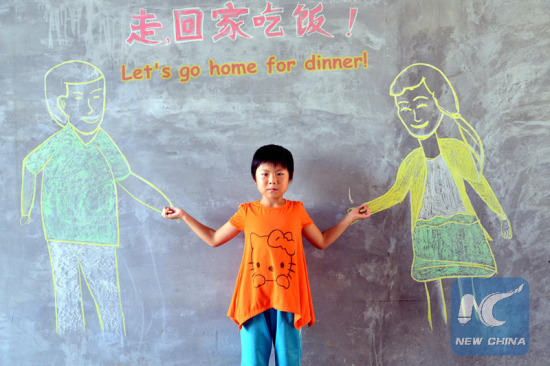
Liu Dongqing poses for photo with her parents painted on a blackboard in Nanguan Village of Chiping County, east China's Shandong Province, July 25, 2015. College students from the Academy of Fine Arts of Liaocheng University came to visit the "left-behind" children and "empty-nest" elderly persons, help them express their wish for family reunion with paintings. (Photo: Xinhua/Zhao Yuguo)
Tao Xingyue, 12, and Tao Junshen, 10, used to dread the end of the Chinese New Year holiday when their parents would leave them at home to return to their distant jobs. This year, they had no reason to cry.
After five years living with their uncle in their village on the outskirts of Chongqing Municipality, the children have their mum and dad back by their side.
Xingyue and Junshen were typical of the 60 million rural Chinese children "left behind" by parents earning a living in distant cities. Mother Yu Changmei, a cleaner, and father Tao Yonghong, a security guard could only return home twice a year from Guizhou Province.
Now, however, they are an example of an increasingly common type of Chinese family -- reunited ones. With growing awareness of the risks for left-behind children, China's migrant population decreased for the first time in about 30 years in 2015. The government wants migrants back home for economic reasons as it works to close the urban-rural development gap, but also to help lonely kids.
On Sunday, the State Council, China's Cabinet, released a guideline on protecting left-behind children, delineating the responsibilities of parents, government and society at large.
This is one prong of a two-pronged approach: Authorities really do not want children left behind at all.
Most residents of Chongqing's outskirts are farmers who earn very little money. The municipal government is helping them start their own businesses from home or to find work nearby.
Chongqing has offered 7.4 billion yuan (1.1 billion U.S. dollars) in low-interest loans to 89,000 migrant workers in the past four years. Businesses that employ more than 100 ex-farmers can get subsidies of up to 600,000 yuan, and 36 industrial parks are offering workshops, entrepreneurial guidance and financing specifically for returned migrant workers.
More than 1.7 million migrant workers have come back to Chongqing since 2010, and nearly a third of them have started their own businesses, according to the municipal human resources and social security department.


















































